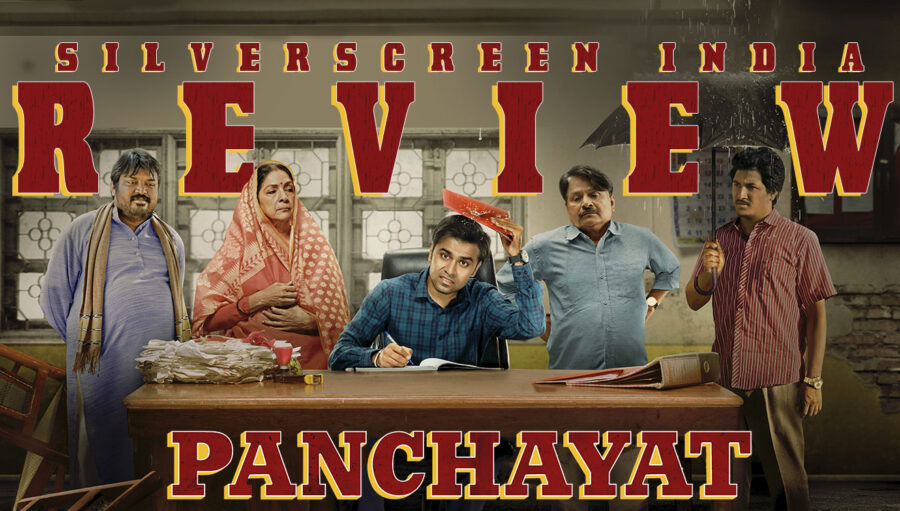Director: Deepak Kumar Mishra
Cast: Jitendra Kumar, Raghubir Yadav, Neena Gupta, Chandan Roy, Faisal Malik
Writer: Chandan Kumar
There is a certain dissatisfaction written across Jitendra Kumar’s face – a sense of being weighed down by the burden of straddling expectations of two different worlds – that makes him the perfect protagonist to essay Indian-bred aspiration.
Kumar’s loyal following on the Indian internet, built on the back of hugely popular TVF shows Permanent Roommates, Pitchers, and Kota Factory, have all touched upon the desire to break away from the monotony of a middle-class existence. But Kumar doesn’t play heroes in any of these outings; instead he plays a more recognisable offshoot: the guy who could have been the hero had he not fallen just short of the mark (his internet nickname “Jeetu Bhaiyya” is proof of the familiarity he evokes).
The actor is the face of urban dreams that are rooted in middle-class misfortune. Where aspiration has no other option but to make room for compromise. By spectacularly using this very cult of Kumar to highlight the distance between ‘Everyman’ dreams and reality, Deepak Kumar Mishra’s Panchayat – an eight-part hinterland dramedy currently streaming on Amazon Prime – sets out to investigate the redundancy of heroism.
At the moment, it’s perhaps the rare Indian show that doesn’t consume itself by recklessly searching for a hero in its self-absorbed, impatient protagonist. It is certainly great timing: Kumar is fresh off the success of Hitesh Kewalya’s Shubh Mangal Zyada Savdhaan, the first Hindi mainstream film to feature – and do justice to – a gay romance. In the film, Kumar played Aman Tripathi, a young man from a conservative family who falls in love with a man – basically another protagonist stuck between embracing modernity and eschewing tradition.
In Panchayat, the actor takes it a step forward by efficiently becoming Abhishek Tripathi, an engineering graduate trapped in a dead-end government job that screams average. He’s the new secretary of a panchayat office in Phulera, an Uttar Pradesh village whose only skill seems to be cutting itself off from civilisation.
The job pays a paltry Rs 20,000 as opposed to the Rs 80,000 his friend is making off a corporate job every month. On Fridays when he puts up party pictures on Instagram, Abhishek is peeling bottle-gourd in his lonesome kitchen to make dinner – a spare room in the panchayat office doubles up as his accomodation in the village. To him, the job comes across as a punishment than progression.
In the opening episode, his friend (a welcome cameo by TVF regular Biswapati Sarkar) tries to make Abhishek look at the positive side of his predicament by comparing his job to Shah Rukh Khan’s awakening as Mohan Bhargava in Swades. It’s a funny dialogue as well as a clever dig at Hindi movies that have made a caricature of rural India.
The hinterland in Hindi cinema is now reduced to a template, acting as a device that trudges a lost urban soul on the road to enlightenment. But Panchayat isn’t interested in that oft-abused narrative. What it is after is far more inventive, audacious, and charming: the dissonance between Indian governance and the Indian way of life. The show’s title might as well be a dig at the country as an institution that comes to “solutions” as per its convenience.
Flawlessly written by Chandan Kumar (not one sub-plot feels laboured), Panchayat manages the distinction of getting the tone, texture, and the intent of its rural storytelling down pat.
As per the government’s women empowerment scheme, Phulera is mandated to have a female panchayat leader. Except Manju Devi (Neena Gupta, scene-stealer), the elected leader in question, is merely a placeholder.
The actual day-to-day responsibilities are under the control of her husband, referred to in the show as Pradhanji (the delightful Raghubir Yadav, finally cast in a role that lives up to his craft).
The implied gender discrimination, where men take over any role that might involve a woman exerting her power, reveal a brand of insecure masculinity that would ideally make for heavy viewing if not a preachy lesson. But Panchayat avoids the trappings of socially conscious filmmaking. Its gaze is never distant, but empathetic towards unraveling just why rural India ends up taking two steps backward every time the country takes a step ahead. Throughout its 30-minute-long eight episodes, the makers touch upon a host of “issues,” right from the tragicomedy that arises when Indian masculinity is under threat (the show’s third episode is a standout half hour of Indian television that spins a phenomenal yarn out of dowry), ingrained patriarchy, superstition, homegrown feminism, and the nature of politics that goads leaders to rule over people instead of serving them.
Recommended
Yet the show’s writing, armed with a lightness of touch and a sense of humour, never turns them into a gimmick that wears its moral superiority on its sleeve. None of these episodes have even a moment that feels designed to house on-the-nose messaging. That’s because Panchayat doesn’t give rural India the step-treatment: it’s aware that what qualifies as “issues” for privileged urban folk is after all just daily life for the hinterland. The show doesn’t prime the educated protagonist as the saviour or the one who possesses the answers – Abhishek is held accountable for his self-serving ways as much as Pradhanji is for his social conditioning.
What makes Panchayat a solid achievement and an essential watch is how it succeeds in being a satire on stilted governance in the guise of dispensing social commentary. It’s not everyday that a show finds a way to work in Akshay Kumar and patriotism into its plot in such rewarding ways that you can’t help but admire its heroism.



